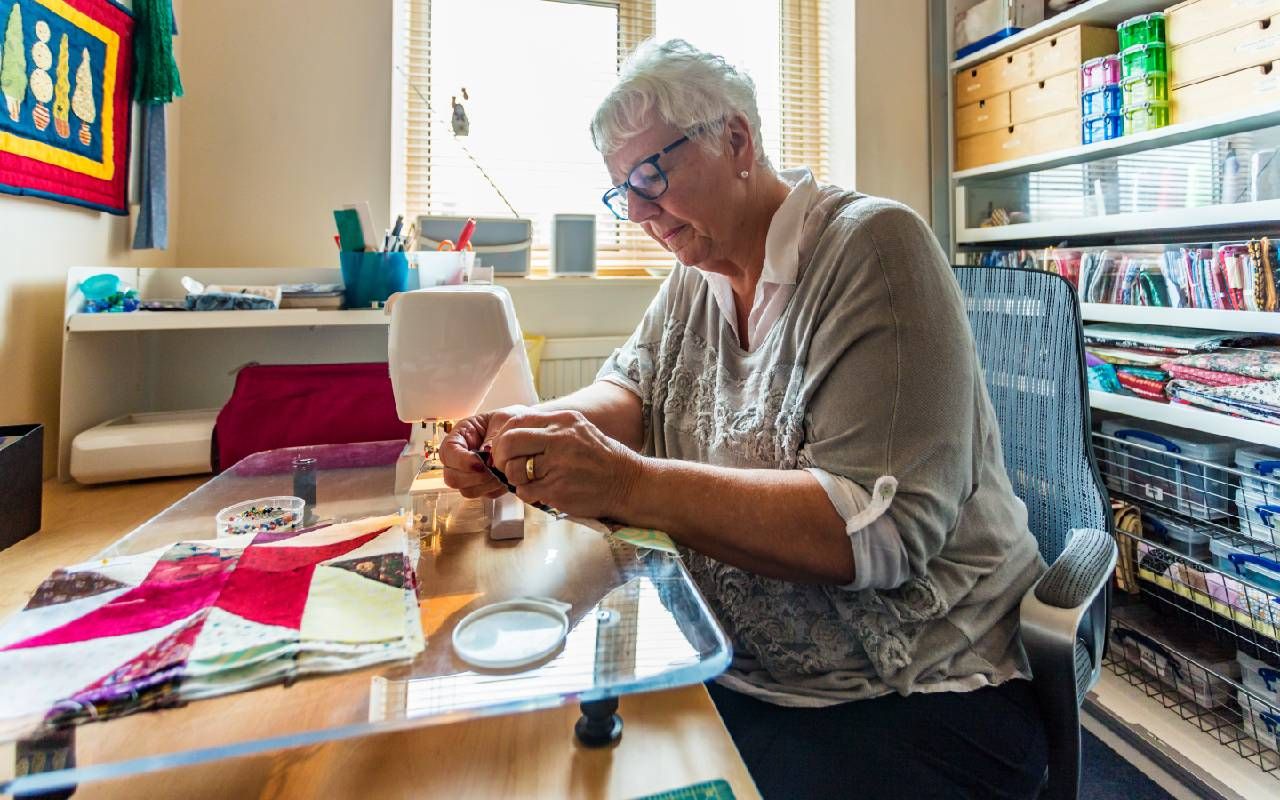The Benefits of Gentler Hobbies
Research has suggested that gentler activities, like gardening and crafts, come with a host of health benefits
Google anything related to health and wellbeing, and your search will turn up generic recommendations. These will range from the U.S. Department of Agriculture's MyPlate dietary resources to the CDC's suggested 150 minutes of weekly activity. You may also find academic studies, like Harvard's recent news brief discussing the importance of hobbies for older adults.

Harvard's brief details a 2023 study. Examining nearly 100,000 adults over age 65, the researchers found that participants who engaged in hobbies had higher life satisfaction than those who did not. This was true across all 16 countries included in the study.
Interestingly, both the study and Harvard's brief highlight a few beneficial hobbies — all "gentler" activities like gardening, crafts and social clubs. This is unlike most generic "healthy hobbies" lists, which often focus on intense physical activity like tennis or ballroom dance, or mentally intense hobbies like knitting.
Examining nearly 100,000 adults over age 65, the researchers found that participants who engaged in hobbies had higher life satisfaction than those who did not.
This focus on intensity might be lessening: Multiple studies have recently looked into the benefits of gentler hobbies. Thus far, the research has suggested that gentler activities come with a host of health benefits.
Recent Research
Harvard's news brief is one of many sources discussing the health benefits of gentler hobbies. A second 2023 study linked five less intense hobbies with successful aging: gardening, reading, watching TV or listening to the radio, participating in social activities and playing cards or other games. Out of more than 7,000 older adults, those with these five hobbies tended to be more physically active, have better mental health and have higher cognitive function, compared to those with few or none of these hobbies.
A 2020 Japanese study linked certain hobbies to decreased dementia risk. Over six years, they surveyed more than 50,000 adults over age 65, and found that travel and playing ground golf (a Japanese game that's a cross between golf and mini golf) lowered dementia risk for men and women. The researchers also noted that "the risk of dementia was lower as the number of hobbies increased."
"Leisure, as a whole, is more powerful than breaking it down to individual activities."
Finally, a 2023 Australian study found that engagement with the arts benefited older adults' mental health. This could include anything from creating art oneself to experiencing others' art at an event like a concert or an exhibition. In an interview with Newsweek, one of the researchers recommended that adults who want to engage with the arts "take part in the art form that makes them feel good."
Though these studies all focused on gentler hobbies, they each identified different activities. What this might suggest is that participation in a hobby — any hobby — is more important than the activity itself.
Asking the Experts
Heather Gibson, Ph.D., would argue just that. She said, "Leisure, as a whole, is more powerful than breaking it down to individual activities."
A professor in the Department of Tourism, Hospitality & Event Management at the University of Florida, and a fellow of the Academy of Leisure Sciences, Gibson co-edited the 2012 book "Leisure and Aging: Theory and Practice." She's studied activities ranging from sports tourism to girlfriend groups.
Much of her research has focused on women, so Gibson highlighted the importance of social connection for older women who are widows, live in rural areas or don't drive. In these scenarios, social networks might be challenging to build or maintain, but they're still "very, very important" for overall health.
Personalizing Your Activities
Gibson further noted that, when you do see your social network, what you do together is less important than being together. Whether it's sports, a coffee date or chatting in someone's living room, "the context," she said, "or the 'who' you're spending time with is actually more important than the activity itself." This allows for a lot of personalization, in terms of individual activities.
"Gardening also comes with other benefits, like being outside in the sun and connecting with others who garden, such as neighbors or a garden club."
Elizabeth Vásquez, DrPH, also advocates for personalization. She's a proponent of physical activity due to its association with increased cognition, on one condition: the activity must be tailored to your individual ability, not a generic adult's. Can't walk the oft-suggested 10,000 steps a day? Don't give up on all movement: "Even a five-minute walk has benefits," she said.
An associate professor in the Department of Epidemiology and Biostatistics at the University at Albany (SUNY), Vásquez noted, "The way we evaluate physical activity among older adults needs to be reframed."
She used gardening as an example. "People don't think of gardening as a physical activity," she said, but it is. Planting seeds, watering plants and weeding each have a physical component, even if it isn't intense like competitive sports or weightlifting. Gardening also comes with other benefits, like being outside in the sun and connecting with others who garden, such as neighbors or a garden club.
"So it's not just the act itself," Vásquez said. "It's all the elements surrounding the act or the physical activity." Generic health guidelines don't always account for these surrounding elements, which, as Gibson argued, might be more important than the activity itself.
Generic guidelines also miss cultural differences. Vásquez, who is the director for the Center for the Elimination of Minority Health Disparities at the University of Albany, noted that many studies on older adults look at golf. "It's a very big thing among white Americans, but it's not as big among, perhaps, Latinos and African Americans."
Moving forward, Vásquez hopes that examining cultural differences will create "more culturally appropriate variations of physical activity." This could help more adults meet their activity goals. Her own research in this area includes a 2023 study on the racial and ethnic differences in physical activity, osteopenia and osteoporosis.
Things get murkier when it comes to how an individual's physical and mental abilities shift as they age. What happens when someone has a hobby that they can no longer enjoy? Devin Celeste Barth, a community occupational therapist and a Ph.D. student at Colorado State University, has seen older adults struggle to accept these changes.
Find a Hobby That Resonates
"There's a grief component that is often neglected throughout the aging process," Barth said. She sees gentler hobbies as one potential way to process this grief.
"Some of these 'gentler' hobbies are nice stepping stones to being willing to try something that maybe is uncomfortable or challenging."
For example, she sometimes works with student veterans who are struggling with an all-or-nothing mentality. If they can't perform perfectly at school, why bother trying at all? When someone comes to her two weeks before finals with a mountain of incomplete assignments, she breaks down the big goal — pass the course — into a smaller one by asking, "Can we read two chapters in the next hour?"
When a student achieves a small goal, Barth calls this a micro victory. She sees gentler hobbies as serving a similar function for older adults. "Some of these 'gentler' hobbies are nice stepping stones to being willing to try something that maybe is uncomfortable or challenging," Barth said.
In short, it doesn't have to be your old hobby or nothing at all. When you're trying to find something new, an end goal of "Find a new hobby" might feel complex and abstract and if you aren't sure where to start, you might not start at all. A more manageable goal might instead be "Attend one art exhibition," "Try out a book club," or as Barth herself suggested, "Plan something with friends."
"It doesn't have to be a big plan like 'Bike across the city,'" she said, but trying one new thing, whether or not you stick with it, can give you the confidence to try it again. Maybe you'll become a member of that local book club. Or maybe the act of going — and then deciding it's not for you — can bolster you to try something else instead, like volunteering with a neighbor. Already you're making progress from that limiting "old hobby or nothing" mindset.
In the end, look for something that resonates. When you find it, stick with it because having a hobby just might be more important than choosing the "right" one.


